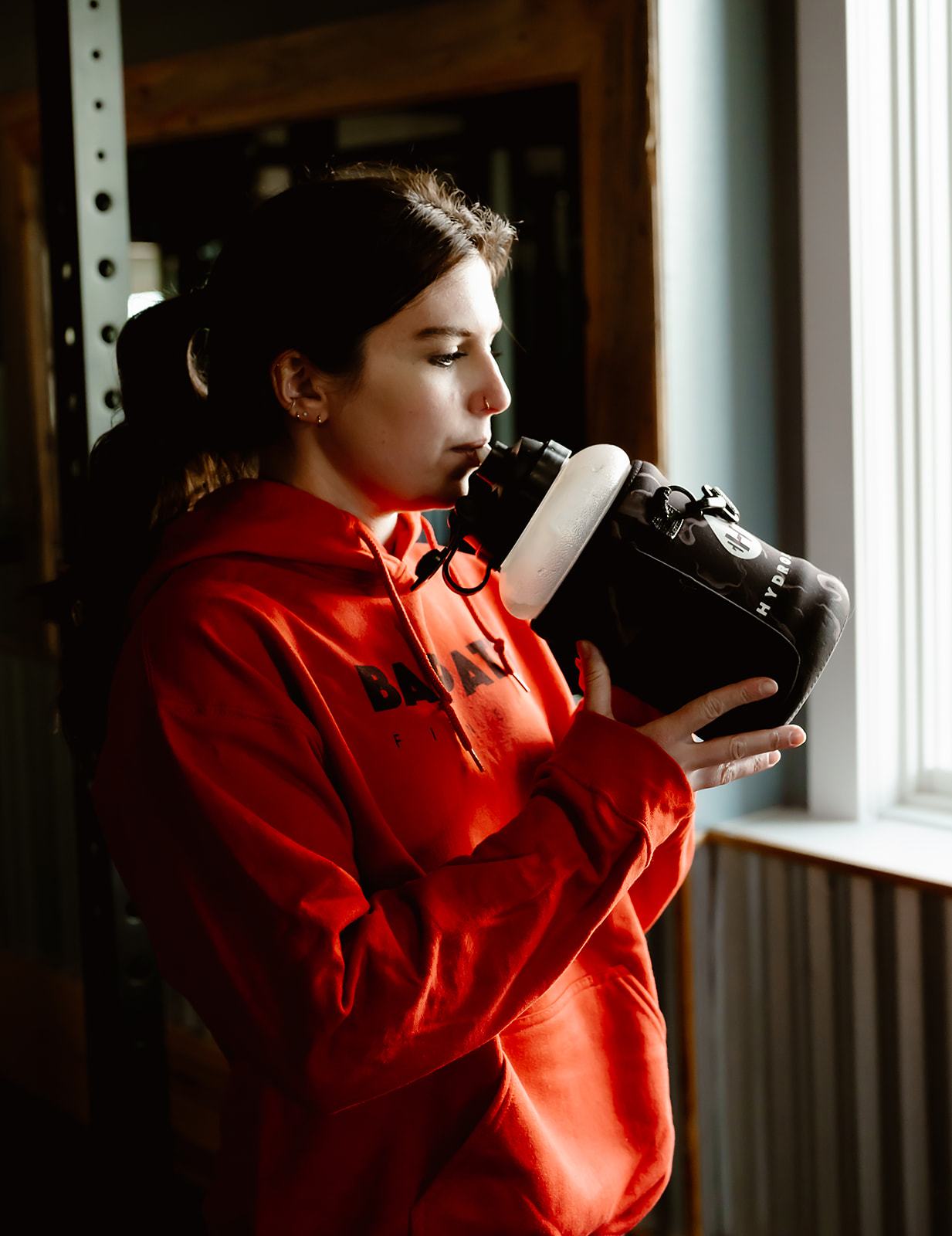Sleep affects almost every type of tissue and system in the body – from the brain, heart, and lungs to metabolism, immune function, mood, and disease resistance.
If we don’t sleep well, we won’t perform well. We can look better, feel better, and perform better once we dial in our sleep quality and quantity.
We’re here to give you the best sleep tips and practices we know in order to help you achieve optimal sleep!
Stages of sleep
At night, we cycle through stages of sleep that correspond with specific brain waves and neural activity. You may have heard of REM sleep, which stands for rapid eye movement sleep. We typically cycle through all stages of non-REM and REM sleep several times during a typical night, with increasingly longer, deeper REM sleep periods happening toward the morning.
The first stage of sleep is relatively light, with heartbeat, breathing, and eye movements slowing down, and muscles relaxing. Brain waves begin to slow from daytime wakefulness patterns in this stage.
The second stage is a period of light sleep before we enter deeper sleep where the body temperature starts to drop and everything is slowing down more.
The third sleep stage is deep sleep. The heartbeat and breathing slow to their lowest levels during this phase.
Finally, we have REM sleep where eyes move rapidly from side to side behind our eyelids. Most of our dreaming happens here. Things speed up a bit here as far as breath work and heart rate; much closer to waking levels.
Each phase of sleep is important. The phases help the mind and body stay rested. Certain stages help you feel rested and energetic the next day, and both non REM and REM phases help you learn information and form memories.
Tips for a good night’s rest
-
Get sunlight in your eyes in the morning
When you wake up in the morning, you experience a surge of cortisol to “get you going”. You want cortisol to be highest in the morning and lowest at night so your body can produce melatonin in order to fall asleep.
Research has shown that blue light can boost this effect in the morning, so getting sunlight in your eyes naturally kickstarts this process. Blue light boosts alertness, helps memory and brain function, and elevates mood.
Doing this before 9am is ideal, though any time upon waking can help. Personally, we love to go outside first thing and do some light movement or stretching if possible.
-
Go to bed and wake up at the same time every day
Aim for no more than an hour’s variability on both ends if possible (sleeping and waking). This will help increase quality of sleep and make it easier to fall asleep as your body will be accustomed to “sleep time”.
-
Stop eating a few hours before bed
When you sleep, your body goes into recover and repair mode. If you eat right before bed, your body’s resources shift to digesting the food you just ate instead of shifting to repair mode for your brain and central nervous system. This can interrupt the quality of your sleep.
-
Go outside at dusk
At dusk, you’ll experience more red light frequencies. While there isn’t a lot of large scale research on red light, there are some smaller promising studies (linked below) that show that red light in the evening could potentially improve sleep quality and melatonin production.
-
limit blue light exposure (electronics) before bed
This is a really important step to a great night of sleep. You get blue light from the sun during the day, but it also exists artificially in electronics.
Exposure to blue light before bedtime can disrupt sleep patterns and interrupt our bodies’ process in creating melatonin, an important hormone needed for sleep.
-
Create a bed time routine
We have all heard about the benefits of morning routines. But, we believe a bed time routine can be just as (if not more) powerful.
Creating a nightly ritual can help you relax and prepare for a good night’s rest.
Our personal routine consists of loading the dishwasher, folding the blankets on the couch, straightening up the kitchen and living room (so we can roll out of bed and get going the next morning) and making nightly chamomile tea.
Additionally, having a calming breath work practice before bed can aid in getting a good night of sleep. We like to use box breathing as we lay in bed before we fall asleep. Box breathing involves inhaling, holding the breath, and exhaling all for the same amount of seconds. So, inhale 5 seconds, hold 5 seconds, exhale 5 seconds, hold 5 seconds and repeat.
Gratitude practice at night can also help. Try writing down 3 things you are grateful for in a journal before bed. This shifts your mentality to gratitude and calmness rather than anxiety about the day to come.
-
Get enough hours of sleep
While quality sleep has the slight edge over quantity as far as importance, you still want to make sure you are getting in enough hours of sleep. For most adults this looks like 7 ½ to 9 hours of sleep every night. Just because you can function on your 5 or 6 hours of sleep every night, doesn’t mean you’re one of those who needs less sleep – you’ve just gotten accustomed to sleeping less. You CAN feel what it’s like to sleep more and function optimally! A consistent routine will help you build to getting more rest.
-
sleep supplements
We saved sleep supplements for last because it’s important to tackle the big rocks first.
However, if you’re looking for something to add to help your sleep practice, it’s important that you understand what sleep supplements are safe.
Magnesium has been shown to increase deep sleep quality as well as help decrease cortisol levels at night. CBD oil also has anti-anxiety and anti-inflammatory properties to help you relax your body and mind before sleep. Reishi mushroom is an adaptogenic mushroom that promotes relaxation, helps to lower stress, and also can help increase sleep duration.
Avoid sleeping pills or over the counter medicines for colds or coughing that make you feel drowsy. These can not only be addictive, but they can also seriously impact your sleep quality. Additionally, use melatonin with caution! Yes, your body naturally produces melatonin in order to fall asleep. But, you don’t want your body to rely on exogenous melatonin (and disrupt your normal production) so it’s not something you want to make a regular practice.
If you’re looking for a solid magnesium supplement or a full spectrum hemp oil, Ned has some great products that we use before bed. Learn more about the Ned products here and if you decide to purchase some, use code STRONGER for 15% off. We personally use the Sleep Blend and Mello Magnesium.
Learn More About Getting a Good Night’s Rest
If you want to learn more, check out Episode 43: How to Get Amazing Sleep on the Stronger Than Your Boyfriend Podcast. And if you’re interested in learning more, join our facebook community.
Resources:
Centers for Disease Control and Prevention. (2020, April 1). The color of the light affects the circadian rhythms. Centers for Disease Control and Prevention. Retrieved December 26, 2022, from https://www.cdc.gov/niosh/emres/longhourstraining/color.html
Figueiro M, Steverson B, Heerwagen J, et al. Light, entrainment and alertness: A case study in offices. Lighting Research & Technology. 2020;52(6):736-750. doi:10.1177/1477153519885157
Health, C. (2022, March 8). How blue light affects your eyes, sleep, and health. health. Retrieved December 26, 2022, from https://health.ucdavis.edu/blog/cultivating-health/blue-light-effects-on-your-eyes-sleep-and-health/2022/08
Lee S, Kim D. Effect of Color Light Stimulation Using LED on Sleep Induction Time. J Healthc Eng. 2017;2017:6030268. doi: 10.1155/2017/6030268. Epub 2017 May 11. PMID: 29065627; PMCID: PMC5443998.
U.S. Department of Health and Human Services. (n.d.). What happens during sleep? Eunice Kennedy Shriver National Institute of Child Health and Human Development. Retrieved December 26, 2022, from https://www.nichd.nih.gov/health/topics/sleep/conditioninfo/what-happens#
U.S. Department of Health and Human Services. (n.d.). Brain basics: Understanding sleep. National Institute of Neurological Disorders and Stroke. Retrieved December 26, 2022, from https://www.ninds.nih.gov/health-information/public-education/brain-basics/brain-basics-understanding-sleep
Zhao J, Tian Y, Nie J, Xu J, Liu D. Red light and the sleep quality and endurance performance of Chinese female basketball players. J Athl Train. 2012 Nov-Dec;47(6):673-8. doi: 10.4085/1062-6050-47.6.08. PMID: 23182016; PMCID: PMC3499892.



